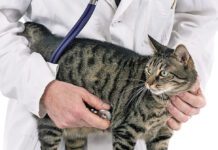EPA Says Beware: Some Flea and Tick Products Are Fakes
Leading brand prescription strength flea- and tick-control products, once available only through veterinarians, are now on sale in retail shops, but theyre still expensive. Worse yet, says the U.S. Environmental Protection Agency (EPA), some might be cleverly-packaged counterfeits.
At least 10 varieties of the Advantage and Frontline lines of products are being counterfeited, according to the EPA, which adds: The counterfeit pesticides appear to have been unlawfully imported and packaged in retail cartons designed to look similar to legitimately registered pesticides sold in the United States.
While the feds investigate, makers of the two leading brands, Bayer and Merial, offer tips on spotting fakes at these web sites: http://www.nofleas.com/ and www.frontline.com/epa. As Zachary Mills, director of veterinary services at Merial, says: The best way to be confident about the source of Frontline products is to purchase through your veterinarian.
———-
Pop-Top Cans and Hyperthyroidism
Many causes have been advanced for the epidemic of hyperthyroidism in cats, which was first reported in 1979 and seems to be getting worse. Thyroid glands might be stimulated to over activity, researchers have suggested, by exposure to lawn and flea control products, too much iodine in food, minerals in hard water or water-borne bacteria, as well as endocrine-disrupter heavy metals, such as mercury.
Veterinary researchers from Purdue University zeroed in on cat food when they reviewed medical records of 169,576 cats that were treated at university-based veterinary clinics over the past 20 years. Their report in the Journal of the American Veterinary Medicine (JAVMA Vol. 224, No. 6), titled Epidemiologic study of relationships between consumption of commercial canned food and risk of hyperthyroidism in cats, points a finger of suspicion toward those convenient little pop-top cans.
Cats that were fed from pop-top cans were found to be 3.5 times more likely to develop hyperthyroidism, compared to cats on dry food. The risk of hyperthyroidism from can opener-type cans was almost as high – three times as likely, compared to dry food.
The problem, the researchers said, could be chemicals used to line the inside surfaces of the steel or aluminum cans – in particular a material called BADGE (for Bisphenol-A-diglycidyl ether). As to why single-serving pop-top cans are more likely to contaminate the contents, the researchers said more of the lined surface area of cans is in contact with the food, whereas larger cans hold more servings with less contact to the liner chemicals.
———-
Paging Doctor Doolittle
We cant vouch for the scientific validity of this journal (whereas most publications cited in CatWatch Short Takes are peer-reviewed by acknowledged experts to ensure accuracy) but the name called out to us from the library shelves at Cornells veterinary college – Species Link: The Journal of Interspecies Telepathic Communication.
The journal is published by Anima Mundi Inc., and the same outfit in Point Reyes, Calif., offers workshops in communicating with animals. Part two of the basic course (animals provided or BYO) teaches how to open the channel to get across to animals and receive what they communicate telepathically in thought, images, impressions, feelings, messages.
Even Dr. Doolittle had to start somewhere. More information is at http://www.animaltalk.net/.



